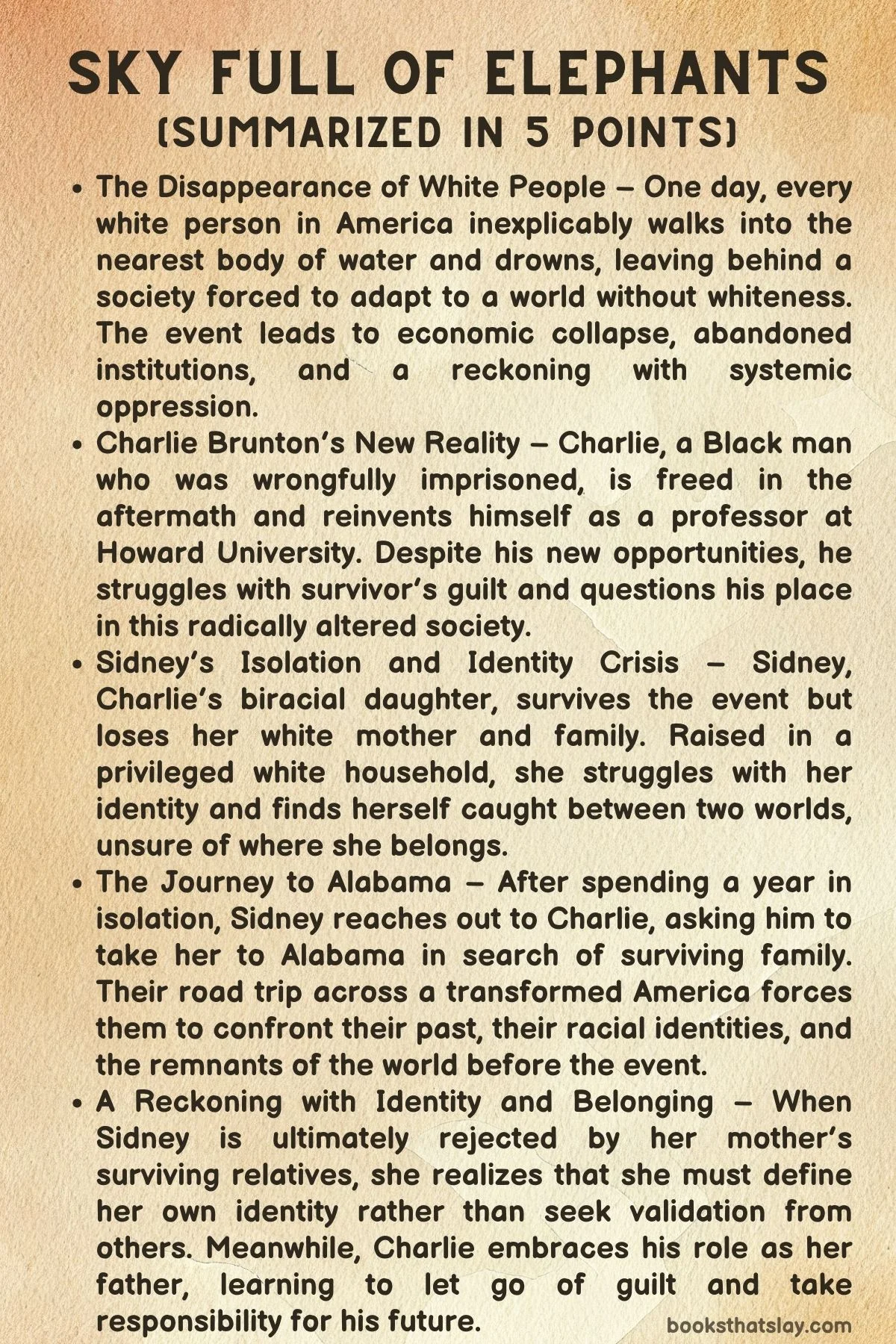Sky Full of Elephants Summary, Characters and Themes
Sky Full of Elephants by Cebo Campbell is a bold and thought-provoking speculative novel that imagines a world where all white people in America mysteriously walk into bodies of water and vanish.
In the aftermath, society is forced to rebuild without its former racial power structures, creating a landscape that is both liberating and chaotic. At the heart of the story is Charlie Brunton, a former prisoner turned professor, and his estranged daughter, Sidney, a biracial teenager who survived the event but lost her entire family. Their journey through this new America forces them to confront identity, belonging, and the ghosts of a world that no longer exists.
Summary
On an otherwise ordinary day, something inexplicable happens: every white person in America—young and old, rich and poor—simply walks into the nearest body of water and drowns.
The event is as surreal as it is devastating, leaving behind a country that must quickly adapt to a reality where whiteness no longer exists. In the wake of the mass disappearance, chaos erupts—financial institutions collapse, prisons are abandoned, and cities begin to transform as nature reclaims urban spaces.
Those who remain—Black, brown, and indigenous communities—are left to grapple with the fallout of a world designed around a racial hierarchy that no longer applies.
At the center of this new reality is Charlie Brunton, a Black man who had spent years in prison for a crime he didn’t commit.
Before the event, he was a convicted felon, but in this new world, his circumstances shift dramatically. The criminal justice system, once designed to keep men like him locked away, has crumbled.
Now free, Charlie moves into a suburban house previously owned by a white family and takes a job teaching electrical and solar power systems at Howard University.
However, despite his newfound stability, he struggles with survivor’s guilt and the weight of his past.
One day, Charlie receives a phone call from someone he never expected—his daughter. Sidney, a nineteen-year-old biracial girl, is the daughter of Elizabeth Waggoner, a white woman from Charlie’s past. Until now, Charlie had never met her, and he wasn’t even sure she existed.
Sidney, having survived the event while the rest of her family perished, has spent the past year alone in her family’s mansion in rural Wisconsin.
Confused and traumatized, she now turns to Charlie, the only parent she has left, and asks him to take her to Alabama, where she believes she may still have family.
Charlie agrees and sets off on a journey to Wisconsin. Along the way, he encounters remnants of the old world and people struggling to redefine themselves in this new one. He meets Ethel, an elderly woman who has been burning vast stretches of land to erase the traces of white America.
She sees the disappearance of white people as an opportunity for renewal and challenges Charlie to let go of his guilt and embrace the future.
When Charlie finally reaches Sidney, their meeting is anything but warm. She greets him at gunpoint, wary of this man she has never known. Raised in a privileged white environment, Sidney never identified as Black and is reluctant to see Charlie as her father.
She is caught between two worlds—grieving the loss of her white family while being rejected by a society that now only sees her as Black. Her isolation has only deepened her confusion about her identity, leaving her resistant to Charlie’s attempts to connect.
As they travel south, their uneasy relationship is tested at every turn. Sidney’s perception of race, family, and belonging is shattered as she experiences a world where whiteness no longer holds power.
She sees communities rebuilding, some thriving, others struggling with lawlessness and uncertainty. She is forced to confront the reality that, for the first time, she is not seen as an outsider because of her Blackness but rather because of the white privilege she once benefited from.
Their journey takes them to Alabama, where Sidney hopes to find the last remnants of her mother’s family. But when they arrive, they are met with hostility. The people Sidney believed to be her family want nothing to do with her.
They see her as an anomaly, a painful reminder of the world they lost. Rejected once again, Sidney must finally decide who she is and where she belongs.
Meanwhile, Charlie is faced with a choice of his own. He can continue running from his past, allowing guilt and self-doubt to dictate his actions, or he can embrace his role as a father and help Sidney navigate this new world.
In the end, Sky Full of Elephants is not just about a world without whiteness but about the deep scars of systemic oppression, the search for identity, and the difficult path to self-acceptance.
Through Charlie and Sidney’s journey, the novel asks: Who are we when the structures that defined us disappear?
And how do we rebuild—not just society, but ourselves?

Characters
Charlie Brunton
Charlie Brunton is a deeply complex character, grappling with both personal guilt and societal upheaval. Before the cataclysmic event, Charlie had been wrongfully imprisoned, which serves as a defining aspect of his identity.
He is a Black man who, after his release, finds himself in a world turned upside down where white people no longer exist, and the societal power structures are in disarray. As a professor at Howard University, Charlie finds himself in an environment that should offer him a sense of purpose, but his self-worth remains shaky.
He constantly questions whether he deserves the life he now leads, given his troubled past. The sudden appearance of his daughter, Sidney, forces him to confront his own history and the idea of fatherhood.
Despite their strained relationship, Charlie embarks on a journey to find Sidney and help her, signaling his desire to take responsibility and make up for lost time. However, his internal conflict about race, identity, and his place in the world shapes much of his journey.
Sidney Waggoner
Sidney Waggoner is a biracial young woman whose life has been marked by trauma and isolation. She is introduced to us as the daughter of Charlie, whom she has never met.
Sidney’s story is one of loss and survival; on the day of the mass suicide, she watched as her white family—her mother, stepfather, and brothers—walked into a body of water and drowned, leaving her the sole survivor. This event shapes her perception of the world, and her identity is marked by confusion and a sense of abandonment.
Raised in a white family, Sidney’s connection to her Black heritage has always been tenuous, and in the aftermath of the mass event, she is left to navigate a world where her white side is erased, but she is not fully accepted as Black. Her journey to find her father reflects her deep need for guidance and belonging, but she struggles to reconcile her feelings toward Charlie, given their estrangement.
Sidney’s character is one of internal struggle as she seeks to define herself in a radically changed world. Her relationship with her father is fraught with tension, largely because of her deep-seated anger toward him for abandoning her, but it is also marked by a desperate need for connection.
Ethel
Ethel is an elderly woman who plays a crucial role in Charlie’s journey, though her presence in the narrative is more symbolic. She is a representation of the generational trauma and the radical steps some are willing to take to sever ties with the old world.
Ethel has burned vast swaths of land in an effort to eliminate the remnants of the previous society, which she sees as irredeemable. Through her, we see the theme of radical action and the desire to break completely from the past in order to move forward.
Ethel challenges Charlie to stop dwelling in the past and to embrace the possibility of the new world. She represents the harsh realities of survival in a transformed America, where the old power dynamics have collapsed, and where those left behind must reinvent themselves.
Ethel’s actions push Charlie to reevaluate his guilt and uncertainty, encouraging him to take ownership of his life in this post-racial world.
Elizabeth Waggoner
Although Elizabeth Waggoner does not appear extensively in the narrative, her impact on the characters, particularly on Charlie and Sidney, is significant. She is the mother of Sidney and the woman who Charlie once had a relationship with.
The novel doesn’t go into great detail about her relationship with Charlie, but it is clear that their connection was fraught with complexities. Her death in the mass event leaves Sidney with a profound sense of abandonment, and it serves as a reminder of how race and identity have always influenced her life, even before the cataclysmic event.
Elizabeth’s death also leads to the severing of the relationship between Charlie and Sidney, further complicating Sidney’s feelings of loss and alienation. Through Elizabeth, we see how family ties and racial identity can become tangled in a society where systemic oppression and personal histories collide in unexpected ways.
Themes
The Collapsing of Power Structures and the Creation of a New World Order
In Sky Full of Elephants, the central theme revolves around the sudden collapse of established power structures and how this absence prompts the survivors to rebuild a new world. The cataclysmic event that leads to the mass drowning of all white people creates a society devoid of the historical racial hierarchies that had previously structured America.
As banks collapse, prisons are abandoned, and cities are reclaimed by nature, the remnants of the old world seem to crumble away. This void allows marginalized communities, especially Black and brown people, to rebuild society on their own terms.
The sudden disappearance of white people forces these communities to confront the legacy of their oppression and rebuild without the presence of a dominant, oppressive force. This profound shift forces individuals to reckon with a new reality, which is both liberating and disorienting, and the characters in the novel must navigate this new world, searching for purpose, justice, and identity.
This theme underscores the complexity of societal reconstruction and the emotional weight carried by those who have lived through centuries of disenfranchisement.
The Intergenerational Transmission of Guilt and Identity Crisis in a Post-Racial America
Another critical theme in Sky Full of Elephants is the intergenerational transmission of guilt and the struggle with racial identity in a post-racial America. Charlie Brunton, a Black man, grapples with feelings of undeserved privilege in this new world.
Having been wrongfully imprisoned and emerging into a world where his status and identity are suddenly not dictated by the legacy of white supremacy, Charlie finds himself wrestling with guilt and confusion. Despite his freedom, he feels torn between embracing his new life and confronting the trauma of his past.
His daughter, Sidney, meanwhile, faces a deep identity crisis. As a biracial individual, she is confronted with the fact that she has lost her white side entirely, but she was never fully embraced as Black.
The world’s sudden shift exacerbates her feelings of alienation. Sidney’s struggles reflect a broader theme of identity, as the rules of racial belonging are rewritten in this new world.
The characters are forced to confront how the past and their racial identities shape their current realities, despite the supposed “freedom” from traditional racial structures.
The Psychological Burden of Surviving Cataclysmic Events: Trauma, Isolation, and Reconciliation
The theme of trauma, survival, and the burden of isolation runs deeply through Sky Full of Elephants. Sidney’s experience of watching her white family drown while she remains untouched by the cataclysmic event is a powerful portrayal of the psychological weight of surviving such a traumatic event.
Her isolation in the wake of the tragedy shapes her sense of self and the world, as she spends a year cut off from society, unable to make sense of her survival. She carries an emotional burden, questioning why she was spared and struggling with the fact that she, too, was once part of a white supremacist family, though she was never fully accepted as part of that world.
Charlie, too, carries a psychological burden, not only from his wrongful imprisonment but also from his complicated relationship with his daughter. Their reunion is fraught with tension, as both characters must navigate their personal traumas while trying to rebuild a fractured relationship.
This theme of trauma and isolation explores the long-lasting emotional effects of living through cataclysmic events and the difficult path to reconciliation, both with oneself and with others.
The Reconfiguration of Racial Identity and Belonging in the Absence of White Domination
One of the most profound themes in Sky Full of Elephants is the reconfiguration of racial identity in a world where white domination no longer exists. This theme is explored through Sidney and Charlie’s personal journeys, as they try to reconcile their understanding of race in a world where the old structures are no longer in place.
Sidney, born to a white mother and a Black father, struggles with her identity in a world that is suddenly “post-racial” but still rife with residual racial dynamics. She cannot understand her survival when everyone she knew who was white perished, and she feels lost in a society where race is now an evolving and fluid concept.
On the other hand, Charlie’s sense of Blackness is also redefined in this new world. He is no longer bound by the historical oppression of Black people by white people but instead must navigate a complex and changing landscape where racial identity is more about individual experiences and self-definition rather than collective struggle against an external oppressor.
The novel questions what it means to be Black in a world that no longer adheres to the racial constructs that have defined generations of African Americans, leading both characters on a journey to understand their place in this new reality.
The Enduring Power of Community and the Quest for Connection in a Fragmented World
At its heart, Sky Full of Elephants also explores the enduring power of community and the deep need for human connection in a world that is fragmented and divided. As Charlie and Sidney embark on their journey across America, they encounter different communities and individuals who have formed their own relationships in the wake of the event.
Ethel, an elderly woman determined to erase the remnants of the old world, challenges Charlie’s understanding of the new society, pushing him to embrace the possibilities of the present rather than dwell in the past. Through these interactions, the novel demonstrates how the need for connection, solidarity, and shared humanity remains essential, even in a world that has dramatically shifted.
Charlie and Sidney’s relationship, though strained and fraught with tension, highlights the complexity of familial bonds and the possibility of healing and reconciliation. Ultimately, the novel suggests that while systems of power may collapse, the human desire for connection, understanding, and mutual support remains a constant force in navigating the challenges of a post-cataclysmic world.


